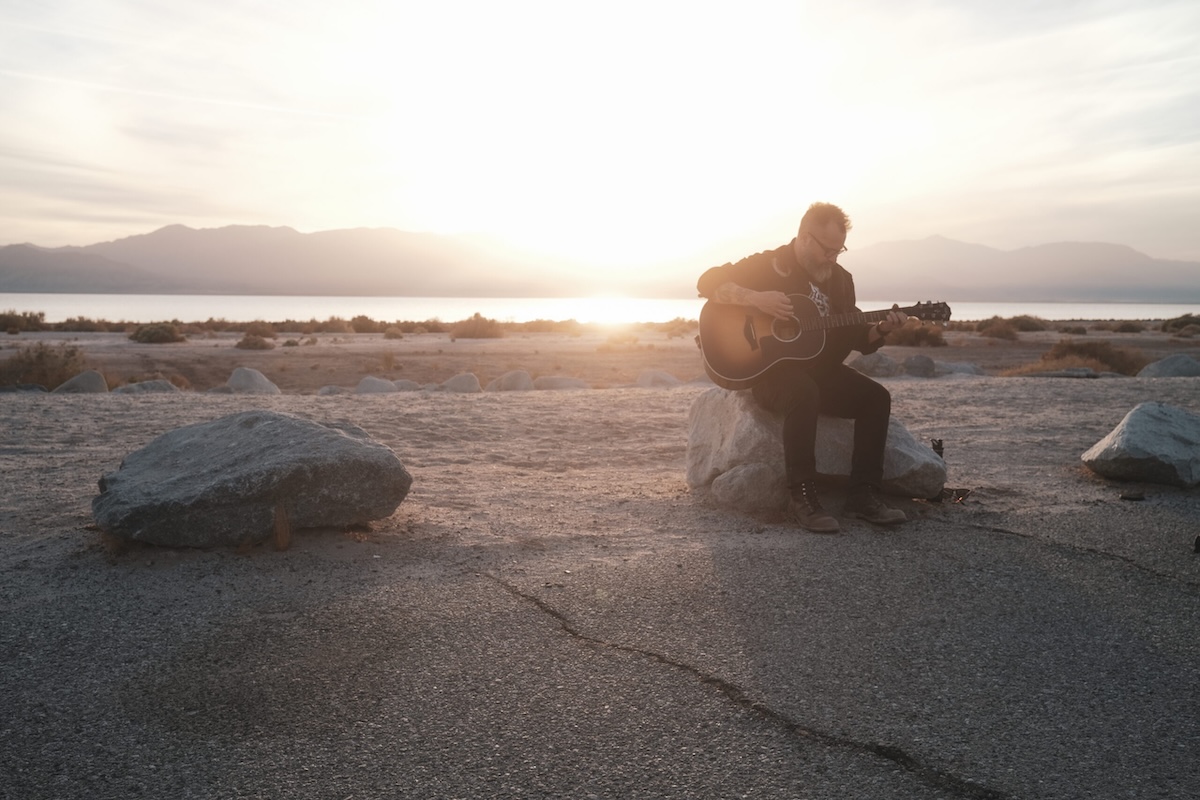Matt Pryor holds on to a lot. That fact becomes clear as the Get Up Kids/New Amsterdams frontman and I settle into a video chat on Halloween to discuss his new solo album, The Salton Sea. In just a couple hours, costumed kids will ring the doorbell of his Lawrence, Kansas house, probably not even knowing who’s house they are at. If they were to step inside, the walls might give it away.
Behind Pryor, to the right, is a framed painting of the artwork for Never You Mind, his 2000 debut album with The New Amsterdams. To the left is a seemingly retired guitar which Pryor says has no real meaning, but you have to wonder if it’s not the trophy instrument he wielded to write opuses like “Action & Action” or “Holiday.” He’s also wearing another prized item—a vintage-looking Jawbreaker T-shirt, nodding to the poetic punk godfathers that inspired a rash of second and third wave emo acts like The Get Up Kids.
Memories like these are something Pryor has come to celebrate more and more in recent years, but it wasn’t too long ago that the loaded weight of the past nearly crushed him during a dark period he refers to as a “reverse midlife crisis.” It first cropped up around 2022 with the confluence of two colliding events.
At the time, The Get Up Kids were preparing to tour for the 25th anniversary of 1997’s Four Minute Mile, shortly after Pryor completed his musician coming-of-age novel Red Letter Days. The 228-page book, released in early 2024, was yet another nostalgic romp, retelling Pryor’s experiences on the road from 1990 to 2000 as The Get Up Kids catapulted into cult classic status on the wings of quintessential scenester albums like 1999’s Something To Write Home About.
“Those two things really fucked me up,” Pryor admitted. “I’d spent a year writing about my life in the ’90s when I was a teenager. And then we were doing the tour performing songs I wrote when I was 19, and it was doing better than the tour we did for the most recent record [2019’s Problems].” The effect, he said, was detrimental. “I lost myself and who I was. I felt like the only thing anybody cared about was what I had done when I was 20. It felt like an Uncle Rico moment from Napoleon Dynamite, where I was going, ‘Remember back in high school when I was like, the shit. I was the king of the mountain.’ And now I’m just an old drunk.”
To try to cope with the mental and emotional disconnect, Pryor self-medicated with alcohol, and the habit quickly spiraled into a full-blown addiction. By 2023, he hit rock bottom and was hospitalized, a scare that quickly sobered him. As Pryor entered treatment, with the support of his wife and three children, he also latched onto a new mindset. “I reconciled with myself that this success that I had when I was younger is a benefit and not a glitch. It’s a positive thing, and it allows me to do other good things,” he shared. “What I realized is that, during the dark times when I wasn’t being creatively active and I wasn’t channeling my energy into making new creative decisions, I was only living in the past. But I found that if I can continue to keep working … it would keep the wheels turning.”
One of the ways he stimulated that creative energy was via a daily writing practice, scribing 1,000 words every morning “just to see if I could do it,” he shared. Initially, some of those essays wound up on his popular Substack and social media. “I found myself writing about the six months from the end of the Four Minute Mile tour, which ended at the Union Transfer in Philadelphia, to going into the hospital and then getting out and into recovery groups.” As he started working on his new album, Pryor said he decided to stick with that theme. “I wanted to write all these stories down because I thought I might subconsciously try to forget the bad times.”
Those written vignettes make up The Salton Sea, Pryor’s seventh solo album out November 14 on his own label, Nightshoes Syndycate/Big Scary Monsters, with help from a successful Kickstarter campaign. Its title references the Southern California wasteland of the same name that Pryor was long fascinated with. The manmade waterway had its glory days in the ’50s and ’60s as an idyllic getaway for celebs and elites who needed a reprieve from the heat of Joshua Tree and the Palm Springs deserts. But in the years since, high salinity levels and a domino effect of environmental factors have shrunken it to a shell of its former self, while noxious odors have transformed the area into a desolate ghost town. “It was sort of a metaphor for how I was feeling about myself at that point,” Pryor recalled, “a place that used to be popular.”
During a break between two Get Up Kids shows in Pomona in March, Pryor and the album’s photographer/art director Mike Dubin drove out to the Salton Sea to capture images that would inspire graphics for the record. Pryor’s reaction upon seeing it with his own eyes surprised even him. “I was most struck by how beautiful it is, and how it’s basically like prime real estate,” he recalled. “As I walked out to the water, I started to sink into the sand, like quicksand in an old movie. It was such a trap, a gorgeous place that’s so poisonous.”

Although Pryor is hesitant to call The Salton Sea a concept album, there is a definitive arc to the 10-track confessional. It opens with a building guitar and drum interplay on the title track in which Pryor begs, “Let the waves wash over me, a quiet world free from fear. This is where I’ll disappear.” Yet,as he grapples with being “a professional imperfectionist” on the jangly third track, admits to “the weight suffocating me” on earworm tune “The Dishonesty” and cops to feeling like an imposter on the vulnerable climax of “Union Transfer,” the despair turns into a tidal wave of reflection. By the billowing album closer “Doubt,” there’s a final sense of redemption. The song is Pryor’s favorite on the album, as much for the layered sound as its meaning.
“It’s supposed to be the end of the hero’s journey where I’m back where I started, but I figured something out. And I’ve changed. … I feel so much more myself now, but I think I had to go through that darkness in order to get to that,” Pryor said, comparing it to one of the affirmations that really helped him in his recovery. “We talk about the gift of desperation. It finally got to the point where I had to change. And having that doubt was a positive thing. … There was something cathartic about letting it out, and it was very, very helpful.” In fact, by the time the 25th anniversary tour of Something To Write Home About came along in 2024, with new parameters in place (like making the tour bus a sober space), his interpretation of memories had a whole different effect on him. “I didn’t get into a bad place emotionally,” Pryor shared. “I could celebrate it and I put everything into the performance in a positive way.”
In January 2026, Pryor will embark on an expansive club tour where he’ll perform the new solo material live. Joining him will be two special guests, his children Jerzy (who also performs on the record) and Lily (an up-and-coming talent in her own right who’s logged time with her dad on previous tours). When asked how he feels about his kids performing songs that pull back the curtain on the darkest period of his life, Pryor said he hadn’t really thought about it.
“I had only been thinking about it from the practical sense of how to make the songs sound good and less about what the subject matter is, which is kind of how I approach performing in general,” he revealed, adding that in a way, the songs are their stories, too. “They lived through it,” Pryor said, adding that they also have a healthy perspective. Aged 23, 21, and 18, Pryor’s kids are part of a generation where “mental health is very front and center and it’s a very comfortable thing to talk about,” he said. “Because of them, I’m a very big advocate about being open and talking about difficult subjects.”

It’s an openness that Pryor hopes can eventually be adopted by the larger music industry as well. “For a long time, I have wanted to discuss mental health in the touring industry, but I was never really entirely sure how to do so, even before I got sober,” he shared. “There’s this stigma of I live a charmed life, I shouldn’t complain and touring is, quote/unquote ‘easy.’ You’re supposed to wear leather pants and only appear in spotlights and not talk about money, mental health, religion, or substance abuse,” he lamented. “But as someone who battles depression, at times it’s been really difficult and it just wasn’t considered.” Pryor wanted to make one thing clear: “I very much appreciate what I get to do for a living.” But, the flipside he said, is, “there’s no way to say this job is hard without sounding like you’re complaining or like you’re looking a gift horse in the mouth.”
If there’s one thing Pryor’s recovery taught him, it’s that being open and honest is imperative. Doing so also taps into a feeling he still holds onto from when he first started in music—before the fame and the mindfucks got in the way. “The scene that I grew up in and that I started touring in was playing in people’s basements and making your own merch. It was very DIY and there was a one-on-one aspect. There was no prospect of getting famous or making much money,” he recalled, conceding, “It was sort of like, this is just what we do because we’re all misfits and we need each other. That’s where I feel comfortable.”



